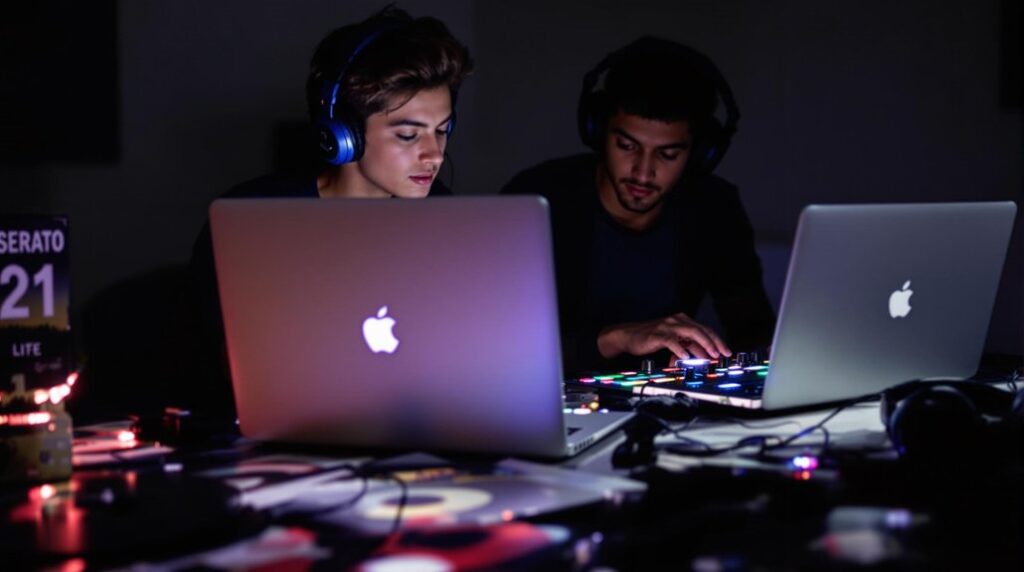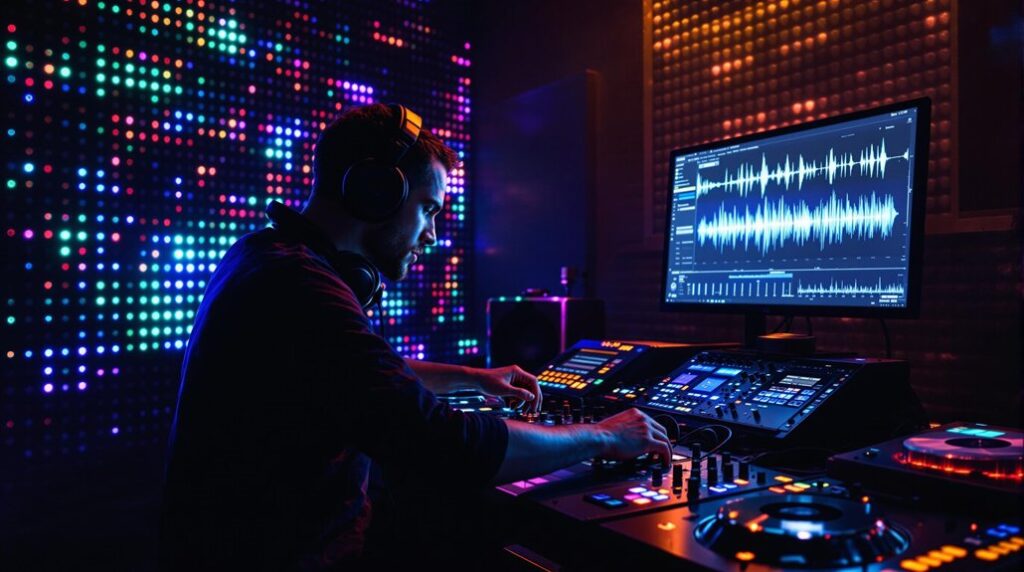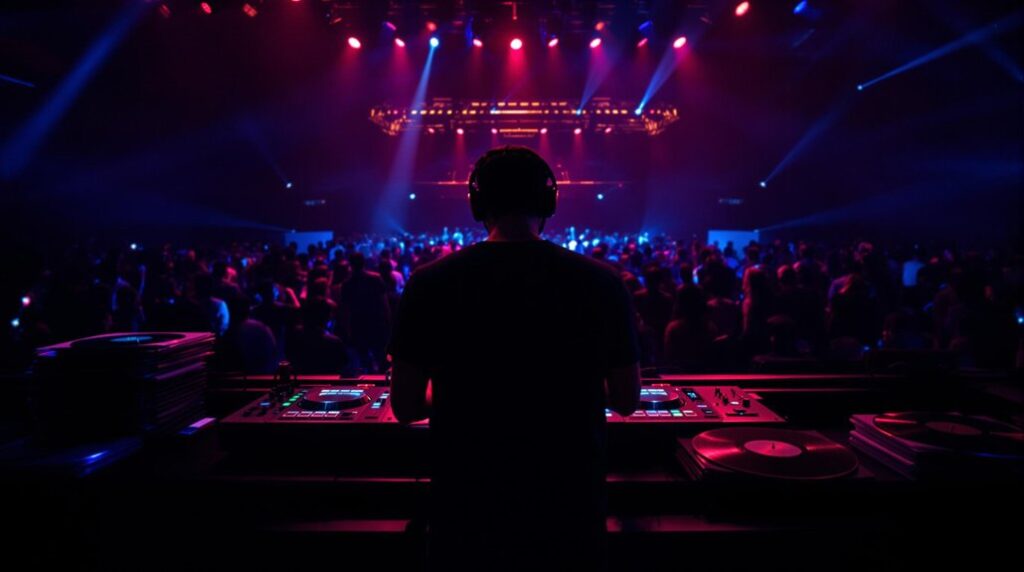To become a DJ, start by understanding different types of DJs, such as club and radio DJs. Choose budget-friendly equipment and learn software like Serato DJ Lite. Develop essential skills like beatmatching and track selection. Build a diverse music library and experiment with genres to create a unique sound and brand. Networking and performing locally can secure your first gig. By following this path, one can master the foundational skills needed to advance. Consider exploring further to enhance your journey.
Key Takeaways
- Begin by acquiring budget-friendly DJ equipment like controllers and download free software such as Serato DJ Lite for practice.
- Develop essential skills like beatmatching and track selection through consistent practice and online tutorials.
- Curate a diverse music library of 50-100 tracks from digital marketplaces and local record stores.
- Experiment with different genres to identify and develop your unique sound and style.
- Build a personal brand and engage with audiences on social media platforms like Instagram and SoundCloud.
Understanding the Different Types of DJs
In the world of music, DJs play a pivotal role in shaping auditory experiences across various settings. The types of DJ are as diverse as the environments they perform in.
Club DJs excel in DJ mixing, utilizing beatmatching to energize dance floors in nightclubs and festivals.
Radio DJs blend music genres with journalism, managing studio equipment and enchanting audiences with commentary.
Wedding DJs, or mobile DJs, adapt to diverse preferences, ensuring memorable private events with their versatile music selection.
Turntablists showcase their prowess using turntables as instruments, engaging in scratching and beat juggling.
Beginner DJs, often digital DJs, start as bedroom DJs, honing skills at home and sharing mixes online.
Each type of DJ brings unique expertise to the music scene.
Choosing the Right DJ Equipment and Software
Selecting the appropriate DJ equipment and software is vital for those commencing their DJ journey, with budget-friendly options like DJ controllers providing a cost-effective entry point.
Essential software choices such as Serato DJ Lite offer a reliable platform for beginners, while more advanced options like Serato DJ Pro and Traktor Pro 3 cater to those seeking greater functionality.
Investing in quality headphones and monitors further enhances the overall experience, ensuring accurate track cueing and superior sound clarity.
Budget-Friendly Equipment Options
Aspiring DJs can commence their musical journey with confidence, knowing that budget-friendly equipment options are readily available without compromising on quality.
Budget-friendly DJ controllers priced around £150 offer a cost-effective entry into DJing, providing novice DJs with the tools necessary for a solid start.
Essential DJ software like Serato DJ Lite is free, offering reliable two-channel mixing that suits beginners.
Rekordbox, another popular choice, provides a free version for efficient music management, especially when paired with Pioneer DJ hardware.
For those seeking enhanced functionality, Traktor Pro 3 is a robust option at $99, ideal with Native Instruments gear.
Quality headphones are indispensable; the Pioneer HDJ-X5, starting at around £100, guarantees precise sound monitoring during performances.
Essential DJ Software Choices
When commencing on the journey of DJing, the right software is pivotal in shaping a DJ's skillset and performance capabilities.
DJ software options like Serato DJ Lite offer free versions for beginners, providing a solid foundation for developing mixing experience. For those seeking advanced features, Serato DJ Pro, priced at $129, is ideal when used with compatible DJ controllers.
Rekordbox stands out as a thorough music management tool, allowing DJs to organize their music library effectively, with both free and subscription options.
Traktor Pro 3, priced at $99, delivers powerful features for professional DJs, best paired with Native Instruments hardware.
Virtual DJ, widely downloaded and free for home use, supports video mixing, expanding creative possibilities for aspiring DJs.
Developing Fundamental DJ Skills
Mastering fundamental DJ skills is an essential step in a DJ's journey, beginning with the art of beatmatching. This technique involves aligning the tempo and phase of two tracks to create seamless shifts, a cornerstone of DJing.
Understanding song structure is equally important, as most music follows a 4/4 time signature, enabling DJs to mix at musically logical points.
Regular practice is vital for honing these skills, and many recommend utilizing online tutorials to expedite the learning process.
Effective use of DJ software, such as Serato, Traktor, and rekordbox, further aids in mastering techniques like EQing and gain control.
These tools facilitate better organization and practice, ensuring DJs achieve a polished sound and confidence in their performances.
Building Your Music Collection
Cultivating a well-rounded music collection is an essential endeavor for any DJ seeking to enhance their craft and performance versatility.
Building your music collection begins with curating a diverse music library of 50-100 tracks across various genres. This diversity enhances both practice sessions and live performances.
To achieve this, DJs should:
- Explore digital marketplaces like Beatport and Bandcamp for new releases.
- Visit local record stores for unique finds to enrich their music library.
- Organise your music into playlists based on mood, genre, and event type.
- Stay updated with trends by subscribing to DJ record pools.
Additionally, understanding licensing and copyright implications guarantees the legal use of tracks in public settings, safeguarding against potential legal issues.
Creating Your Unique Sound and Brand
Defining a DJ's identity involves a strategic blend of musical influences and creative experimentation, allowing them to craft a personal style distinct from the rest.
Building a distinctive image requires a memorable DJ name and logo, with consistent branding across all platforms to enhance recognition.
Defining Your DJ Identity
While starting on the journey to becoming a DJ, establishing a unique identity is essential for standing out in a crowded field.
Defining your DJ identity involves creating a distinctive DJ name, crafting visual branding, and developing a unique sound. To accomplish this:
- Experiment with Genres: Incorporate favorite artists as references to inspire a personal style.
- Create Consistent Branding: Develop a recognizable logo and visual branding to guarantee consistency across promotional materials.
- Understand Your Audience: Tailor music selections to target audience preferences, enhancing brand appeal.
- Engage with Followers: Regularly share mixes and interact on platforms like Instagram and SoundCloud to build a fanbase.
Building a Distinctive Image
Establishing a distinctive image as a DJ necessitates an intentional approach to crafting a unique sound and brand. DJs should begin by experimenting with various genres, drawing inspiration from favorite artists to define their unique sound.
A memorable DJ name and logo are essential, reflecting personal and musical identity while maintaining consistency across social media channels.
A diverse music library should be curated to align with both personal taste and audience preferences, enhancing brand appeal.
Sharing original mixes on platforms like Instagram and SoundCloud fosters community engagement and broadens reach.
Collaboration with other artists and DJs is also important, facilitating cross-promotion and introducing DJs to new audiences, ultimately solidifying their presence in the competitive DJ scene.
Networking and Securing Your First Gig
Aspiring DJs can greatly boost their career prospects by diligently cultivating a robust network within the music industry.
To start, attending local music events is essential for networking, meeting other DJs, producers, and promoters. This enhances opportunities for securing a first gig.
Building a following involves using social media platforms like Instagram and SoundCloud to showcase and record mixes, engaging with fans, and establishing a professional online presence.
Collaborating with DJs further expands one's network and opportunities for joint performances.
Consider these strategic actions:
- Attend local bars and clubs to inquire about opening slots, even if unpaid.
- Record and share mixes on platforms like MixCloud to attract venue attention.
- Engage actively with fans and event organizers online.
- Collaborate with local DJs for shared audience exposure.
Frequently Asked Questions
Where to Start if You Want to Be a DJ?
For aspiring DJs, mastering mixing techniques basics and exploring music genres is vital. Investing in DJ equipment essentials, engaging in online DJ courses, practicing regularly, and attending local DJ events helps in building a music library and promoting oneself online.
How Do I Become a DJ for Beginners?
To become a DJ, beginners should focus on acquiring DJ equipment, mastering mixing techniques and music genres, utilizing online tutorials, engaging in networking opportunities, securing local gigs, refining song selection, establishing practice routines, and building their brand confidently.
Is 25 Too Old to Start DJ?
Age perception suggests 25 isn't too old. Late starters in DJ success often embrace diverse music genres. With a manageable learning curve, equipment investment, and networking opportunities, personal motivation enhances skill development, ensuring career longevity in this dynamic field.
Can You Become a DJ With No Experience?
One can certainly become a DJ with no experience. Utilizing DJ equipment, exploring music genres, mastering mixing techniques, establishing practice routines, utilizing online tutorials, and adopting networking strategies are essential. Music production, performance tips, branding, and local gigs further enhance success.
Conclusion
Starting on a DJ career requires a strategic approach, blending passion with skill. By understanding the various DJ types, selecting suitable equipment and software, and honing essential skills, aspiring DJs lay a solid foundation. Building a diverse music collection and cultivating a unique sound and brand are vital for standing out. Networking effectively can lead to securing that all-important first gig. With dedication and perseverance, mastering the art of DJing becomes an attainable and rewarding journey.




